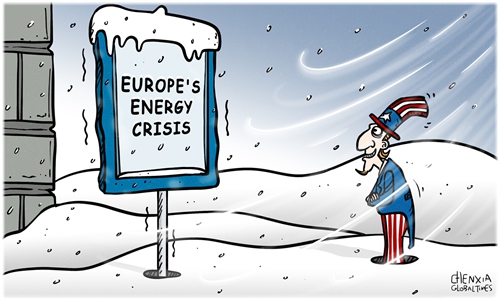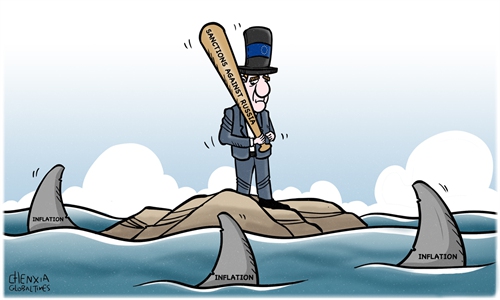Sweden Democrats surge an epitome of right wing rise in Europe, to hit US-Europe ties

Swedish Prime Minister Magdalena Andersson arrives for a press conference after she presented her resignation to the speaker of the Swedish Parliament on September 15, 2022, in Stockholm. Photo: AFP
Europe is encountering political upheaval.Swedish Prime Minister Magdalena Andersson resigned on Thursday after an unprecedented right-wing and far-right bloc narrowly won Sunday's election. The far-right anti-immigration Sweden Democrats (SD) are poised to become the largest party on the right and will have a big say on the new administration's program.
The SD, which has roots in the neo-Nazi movement, takes a tougher stance on crime, has a plan to make Sweden's immigration rules among the most restrictive in the EU, and vowed to "make Sweden great again," a Trump-style slogan.
The result is not surprising, said Cui Hongjian, director of the Department of European Studies at the China Institute of International Studies. He continued that this is because Sweden is confronting an increasing severe challenge. In comparison to the ruling center-left bloc, the right wing, especially the SD, will propose some bold and radical reforms, which caters to the mentality of the Swedish public. Issues such as immigration and crime have precisely been the spotlight of the Swedish recently, and these are what far-right parties like the SD are skilled at. This can explain why they gained more support.
Some experts noted that the Swedish public is also discontent with the manner in which the incumbent government is dealing with the energy crisis. Andersson's loss may also have something to do with the energy policy of her government. When Sweden and other European countries followed the US in sanctioning Russia, it turned out only Europe is suffering from the energy crisis, while the US is not nagged by the shortage of energy. The public tends to be disappointed that the government blindly follows US' lead. Such sentiment will grow stronger as winter approaches, said an international relations scholar who requested anonymity.
Populism is on the rise in Europe, and far-right forces have ramped up their influence in European politics. French far-right Rassemblement National leader Marine Le Pen had a strong showing in 2022 presidential elections. With the September 25 election of Italy approaching, polls have consistently shown that a rightist coalition led by the nationalist Brothers of Italy party and also involving the League party and Forza Italia is on course for a clear victory.
One reason why European far-right parties have gained mounting support and influence is because the traditional establishment parties in Europe are incapable of coming up with satisfactory solutions to the growing number of problems in Europe, such as the financial and refugee crisis, as well as the heavy burden of social welfare, while the set of rhetoric and proposals by the far-right ones is more likely to win over people's hearts.
Furthermore, in the face of many conflicts and challenges, European countries tend to seek a conservative solution as a response, that is, to divert domestic attention by underlining external threats or challenges.
The destinies of European countries are interconnected. When a far-right party gains power in one country, it will soon have an impact on other countries. Therefore, it cannot rule out the possibility that far-right parties will be popular in more European countries.
If more far-right parties gain evident political influence and play a vital role in their government, it will severely hit US' relations with Europe, and Europe will become more suspicious of the US, said the anonymous expert.
Le Pen said in April that there should be a "strategic rapprochement" between NATO and Russia once the Ukraine crisis ended, and she would pursue a foreign policy at equal distance from Washington and Moscow. With more far-right parties gaining ground, these European countries may show a more cooperative stance toward Russia, the expert continued.
Many US' propositions toward Europe are Atlanticism, which is at odds with those from the far-right parties vowing to protect their countries' own national interest. This will heavily hit US' plan to pull its European allies to follow its lead on its global strategy.


